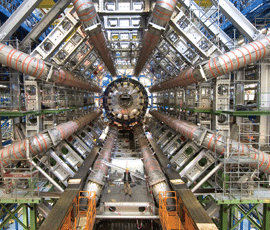The Higgs boson, which was predicted nearly fifty years ago, is the elementary particle needed to explain why and how particles have mass. The ‘Standard Model’ of particle physics, which describes how the world is constructed, was unable to fully explain why the most fundamental particles of the universe had mass and why they were different. The discovery of the Higgs boson in 2012 at the Large Hadron Collider (LHC) in Geneva is the first step towards filling this gap.
The particle physics research group at Queen Mary’s School of Physics and Astronomy has been closely involved in the design and construction of essential components of the ATLAS apparatus, as well as analysis of the particle collisions recorded at the LHC.
Researchers at Queen Mary were also integral to the development and maintenance of ATLAS software as well as providing computing resources dedicated to the LHC computing grid, which connected 200,000 computers providing 24/7 access to the resources needed by particle physicists.
"Postulating the existence of an additional field, of which the Higgs boson is the manifestation, was a plausible and elegant solution but it was still a significant leap of faith, particularly impressive as it preceded nearly 50 years of additional experimental measurements," said Dr Lucio Cerrito, Reader in Particle Physics at Queen Mary.
The LHC is offline until 2015 and is currently being upgraded so that it can accelerate particles to even higher energies. Researchers from Queen Mary will be involved in future experiments to perform precise measurements of particles and hunt for other new particles.
Dr Jonathan Hays, a Lecturer in Particle Physics at Queen Mary and researcher on the ATLAS experiment, said: “It’s great to see the award of the Nobel Prize for Physics to these two physicists, recognising their contributions to human knowledge and the importance of this fundamental research.
“The LHC is due to restart in 2015 and we’re already working hard to prepare for the next flood of data. Our work will continue to explore the fundamental laws of nature, search for cracks in the Standard Model and a deeper understanding of the universe.
“It’s a happy ending to a huge and exciting chapter in the story of fundamental particle physics, but it’s far from the end of the book.”



